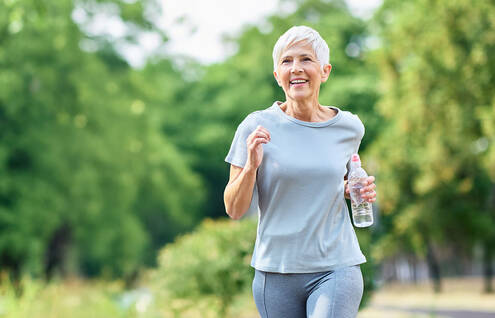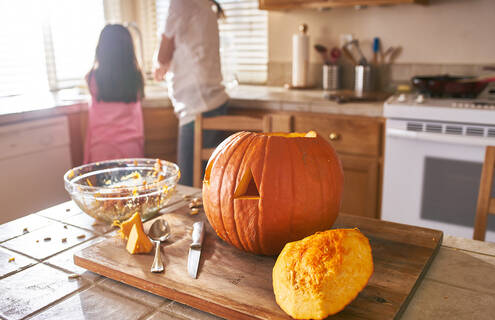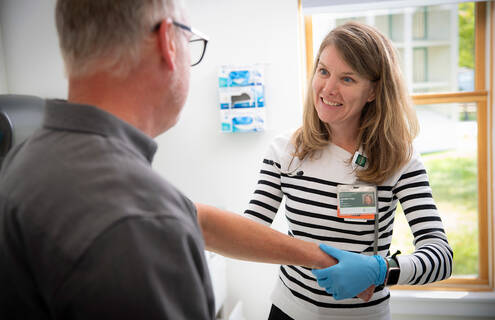
People generally don’t drink enough water.
Kristine A. Karlson, MDYour body is good at giving clues that it needs fluids.
Headache, nausea, abdominal pain, thirst and tiredness are often telltale signs that your body is dehydrated.
Your body needs water to deliver nutrients to your cells, remove waste from your body, protect joints and organs and regulate your body temperature.
To do all that and stay hydrated, how much water should you drink daily—and do other fluids count?
What’s the right amount?
You've probably heard you should drink eight glasses of water a day to stay hydrated. Is that still true?
“At a minimum, I suggest people consume between 64 to 80 ounces of water—or eight to 10 cups—a day,” says Dietitian Ashley C. Medhurst, RD, of Cheshire Medical Center, a member of Dartmouth Health. “But it depends on each individual, as not everyone may need this much—and some may need more.”
Exactly how much water you need every day can depend on outdoor temperatures, physical activity, your health and even being in higher elevations, especially over 5,000 feet.
What to drink?
Drinking water is the gold standard for staying hydrated. But you can also get water from juice, milk, coffee, tea, fruits, vegetables and other foods and beverages.
Sports drinks and electrolyte powders can be useful for hydration, especially if you’re an athlete in training or working all day in the sun. But otherwise, if you eat a balanced diet, you're most likely getting plenty of electrolytes from food, according to the American Heart Association.
According to a 2024 report from the U.S. National Academies, about 80 percent of your total water consumption comes from drinking water and beverages—including caffeinated beverages—and the other 20 percent is from food, like watermelon and soup.
“People talk about how coffee dehydrates you,” says Kristine A. Karlson, MD, a family and sports medicine physician at Dartmouth Health’s Dartmouth Hitchcock Medical Center. “The caffeine is a little bit of a diuretic, but it’s still a net gain and better than not drinking anything at all.
Getting water from other drinks and foods is fine, if you don’t overdo it with sugary or caffeinated drinks.
“Then you’re consuming extra calories, added sugars and potentially too much caffeine,” says Medhurst. “It's not the way you want to go. You don't want to drink eight sodas a day.”
Your thirst changes with age
If you’re thirsty, then you’re already dehydrated. People over 65 are at an increased risk of dehydration because their bodies don't demand water like they used to at a younger age.
“Your sense of thirst gets worse over time,” Karlson says. “And if you're used to drinking only when you're thirsty, you're not going to drink as much.”
Dehydration is especially dangerous in older adults. Not drinking enough fluids can lead to a urinary tract infection (UTI) because without proper fluid intake, your body can’t urinate and flush out bacteria.
UTI symptoms in older adults can lead to drowsiness, poor appetite, falls, confusion and hospitalization.
Heat waves can be fatal for older people, too.
“If you can’t stay ahead of your hydration because you're not thirsty but you’re sweating at home in a heatwave, that can be a serious problem,” Karlson explains.
Subscribe to the Living Better newsletter
Your trusted resource for reliable and up-to-date health and wellness information in the Northeast. Get it delivered to your inbox every other week.
Check your urine
Most people urinate about seven to eight times a day. If you’re not urinating much or your urine is dark, then you’re not drinking enough fluids.
“A nice pale, yellow-colored urine is really what you're aiming for,” Medhurst says.
What to look for:
Hydrated: Pale, odorless and ample urine usually means you’re well hydrated.
Mildly dehydrated: Slightly darker yellow urine can signal you need more water.
Dehydrated: Medium-dark yellow urine often indicates you’re dehydrated.
Very dehydrated: Darker, strong-smelling urine in small amounts can be a sign of dehydration.
You may be drinking too much water if your urine is entirely colorless or clear. Drinking too much water dilutes your blood and decreases the electrolytes in your body, especially sodium. But being dehydrated is much more common than becoming overhydrated.
What if you’re at the beach all day?
Your body naturally loses water from breathing, sweating, urinating and bowel movements. Relaxing at the beach, sitting in a sauna, exercising, diarrhea, vomiting or fever can also cause dehydration.
“As dehydration gets more severe, that's when the dizziness and the lightheadedness can start,” Medhurst says. “Your heart rate can get more rapid, and your eyes can look more sunken. Being dehydrated becomes more severe as shock and confusion set in.”
Signs of dehydration include:
- Thirst
- Fatigue
- Dizziness or lightheadedness
- Urinating less
- Urine that’s dark yellow or even light brown in color
- Dry skin or mouth
- Sunken eyes
- Headache
- Muscle or abdominal cramps
- Fainting
- Confusion
- Fast heart rate and breathing.
Having trouble drinking enough water?
To get in the habit of drinking more water, the Centers for Disease Control and Prevention (CDC) recommends:
- Carrying a reusable water bottle with you
- Freezing water in freezer-safe bottles for ice-cold water all day
- Drinking water when eating out at a restaurant
- Serving water during meals
- Adding a wedge of lime or lemon to your water.
Drinking eight glasses of water a day is a good rule of thumb, Karlson says. But it’s not a hard-and-fast rule.
“It's a nice tagline. But it's hard to say if it’s the correct amount,” she says. “It’s a guideline to motivate people.”
Even if eight glasses of water or other fluids seem like more than you can drink, Karlson says it’s a helpful parameter.
“People generally don’t drink enough water,” Karlson adds. “The eight glasses recommendation makes you realize you probably need to up your game and increase your water intake.”
Resources + Related Stories
CDC Guide to Water and Healthier Drinks
Dartmouth Health Beat the Heat Safety Tips
Hydrating for a Healthy Summer
Alcohol is Hurting Your Health


